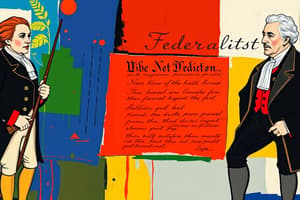Podcast
Questions and Answers
How were Samuel Adams and Thomas Jefferson alike in their position on ratifying the Constitution?
How were Samuel Adams and Thomas Jefferson alike in their position on ratifying the Constitution?
- They both sided with Alexander Hamilton.
- They both disagreed with Patrick Henry.
- They both opposed a strong federal government. (correct)
- They both favored ratifying the Constitution.
What did the Anti-Federalists want to ensure?
What did the Anti-Federalists want to ensure?
- Ratify the Constitution.
- Ensure the Bill of Rights was included in the Constitution. (correct)
- Refuse to vote on ratifying the Constitution.
- Convince Federalists to ratify the Constitution.
What is a faction?
What is a faction?
- A group that strongly opposes ratifying the Constitution.
- A group that strongly favors ratifying the Constitution.
- A group that strongly agrees with another group.
- A group that strongly disagrees with another group. (correct)
Which idea does the excerpt from Publius support?
Which idea does the excerpt from Publius support?
What did Anti-Federalists fear would happen if the Constitution became law?
What did Anti-Federalists fear would happen if the Constitution became law?
According to Anti-Federalists, the Constitution could give the president what?
According to Anti-Federalists, the Constitution could give the president what?
How did Alexander Hamilton and James Madison view the Constitution?
How did Alexander Hamilton and James Madison view the Constitution?
Unlike the Anti-Federalists, the Federalists believed the president should what?
Unlike the Anti-Federalists, the Federalists believed the president should what?
Which statement summarizes the publication's view of government according to Publius?
Which statement summarizes the publication's view of government according to Publius?
What best summarizes the point of view expressed in the excerpt from The Federal Farmer?
What best summarizes the point of view expressed in the excerpt from The Federal Farmer?
Flashcards are hidden until you start studying
Study Notes
Key Figures and Their Positions
- Samuel Adams and Thomas Jefferson both opposed a strong federal government.
- Anti-Federalists, including these figures, sought to ensure the inclusion of a Bill of Rights in the Constitution.
- Alexander Hamilton and James Madison were key leaders supporting the Constitution, positioning themselves against the Anti-Federalists.
Anti-Federalist Views
- Anti-Federalists feared that the Constitution would grant excessive power to Congress, diminishing state authority.
- They believed the Constitution could empower the president too much, leading to potential abuses of power.
- The Anti-Federalists advocated for strong state laws and a decentralized government structure.
Federalist Beliefs
- Federalists, contrasting with Anti-Federalists, believed the president should have sufficient power to govern effectively and lead the nation.
- They argued for dividing lawmaking power among different branches of government via checks and balances.
- A Federalist perspective emphasized the necessity of government as a control against human flaws, stating, "If men were angels, no government would be necessary."
Concepts and Terminology
- A faction is defined as a group that strongly disagrees with another group, keying into the polarized debate between Federalists and Anti-Federalists.
- Checks and balances are considered essential devices for controlling government abuses, reflecting a realistic view of human nature.
Notable Excerpts
- Publius argues the division of legislative authority into branches minimizes the risk of power abuses, supporting the Federalist perspective.
- "The Federal Farmer" expresses concern that a unified government structure could threaten individual liberties and ignite civil discord.
- The view that a single unified government risks the freedoms of citizens highlights the main concern of Anti-Federalists regarding central power concentration.
Studying That Suits You
Use AI to generate personalized quizzes and flashcards to suit your learning preferences.



